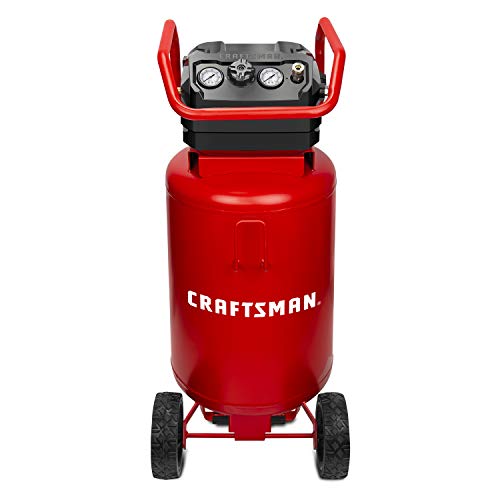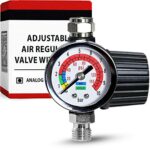
Usage While oil-free air compressors are cheaper, lighter and require less maintenance, oil air compressors are more durable. Change air filters as needed – A dirty air filter on a compressor causes way too much stress on the compressor and almost always shortens its life. Most air compressor companies will specify the kind of air compressor oil that they require.
This means you have to add in oil and change the oil on a regular basis for the machine to continue functioning, just the way you change the oil of your gasoline generator or car. Between an oil lubricated unit and an oil-free one, the oil lubricated air compressors require more maintenance than oil-free air compressors. Just like the oil in your car, the oil in the oil lubricated unit will eventually go bad and will need replacement.
For most of the first timers, it’s hard to distinguish the difference between oil and oilless air compressor. If the expected price vs quality ratio lies within your capacity, you can find out the winder from oil lubricated air compressor vs oil free compressor whatsoever. Hopefully, picking one from both of these two had become way easier for you after going through the whole post on oil vs oilless air compressor.
The rotary screw air compressor uses a helical coil or spiral lobe oil flooded screw to continuously force air into the tank. Early oil-free air compressors weren’t the best for heat dissipation and tended to produce hotter air which increases condensation of water and hot air is less dense. Oil-free air compressors rely heavily on air cooling.
Many air compressors on the market use oil-lubricated pumps, which means they require adding oil and changing oil on a regular basis-just as you would in a car engine. FACTORS TO CONSIDER. For most contractors, the most important factor to consider when choosing between an oil-lubed and an oil-free air compressor is what type of jobs will be completed with the compressor-and how many workers might use the compressor at any one time. Keep in mind that while oil changes extend the life of the compressor, they also need to be factored into the total cost of ownership for the air compressor.
best air compressor oil or oil free Related Question:
Whats better oil or no oil compressor?
While oil-free air compressors are cheaper, lighter and require less maintenance, oil air compressors are more durable. As the oil-free compressors are pre-lubricated, there is no constant maintenance and the unit tends to get dry when the Teflon starts wearing out. They don’t last as long as oil air compressors.
What is the advantage of an oil free air compressor?
Switching from an oil-flooded to an oil-free air compressor provides operators with significantly lower maintenance requirements, including: Fewer ancillary air system components to maintain. Longer timeframes between oil changes. Elimination of expensive oil filters to clean the compressed air.
Are oil Free compressors any good?
These types of pumps (duplex) operate at lower RPM, reducing the noise, heat, and friction which extends the pump’s life cycle and, mixed with better castings/exacting tolerances and better frictionless coatings, make oil-free a great choice in many applications.
How long does an oil free air compressor last?
Oil-lubed compressors are a common choice because they typically provide longer product life. However, technology advancements now allow an oil-free compressor to provide up to 2,000 hours of life, which can approach the life of conventional oil-lubed designs.
Are oil free compressors louder?
Oil-Free Compressors Are Extremely Loud We can’t deny that oil-free compressors used to be much noisier than their traditional oil-lubricated counterparts. However, modern oil-free compressors are not nearly as loud as people make them out to be.
Should you oil air compressor?
Air compressors require constant oil lubrication to prevent friction on the pistons or screws and other moving parts. To make sure your air compressor is running efficiently, it is important to check your oil level regularly and to know how much oil your compressor needs.
Can you leave air in your compressor?
The short answer is yes, it is perfectly safe to leave an air compressor full. However, this assumes that it has been properly maintained, with regular draining to remove accumulated moisture from inside the tank.
What is oil free air used for?
Oil free air is critical for food and beverage applications. In the food and beverage industry, compressed air can be used in a variety of capacities, such as conveying/transporting product, bottle/container blowing, automation, fermentation and for air tools.
What is a good psi for an air compressor?
Most air tools require between 70 and 90 PSI. Any light-to-medium-duty air compressor can easily handle 90 PSI, but you always want the compressor to supply more flow than needed. Pro Tip: Always respect a PSI rating. If you don’t supply enough air volume, the tool won’t operate correctly.
Can you lubricate an oilless air compressor?
Less oil use will result in cost-saving benefits along with an eco-friendlier approach. The name may seem misleading, but oil-free compressors still use oil as lubrication for most of the moving parts and to cool down the unit.
Are oil free compressors quiet?
Additionally, most high-end oil-free compressors have pumps that run at half the speed of older compressors, which also contributes to longer product life and makes the units inherently quieter because they are running slower.
How are oil less compressors lubricated?
Oil-less compressors do use oil. A chamber houses the oil keeping it separate from the compression chamber. Other materials lubricate the piston so it moves freely within the compressor cylinder. On the other hand, an oil-lubricated compressor uses oil to lubricate the piston for air pressurization.
Can you lay a oil free compressor on its side?
You should never lay down an oil-lubricated compressor. Doing so may cause oil to flow where its not supposed to be and contaminate the compressor components.
Why are oil less air compressors so loud?
Generally, reciprocating compressors produce the loudest sounds, due to their dual piston pumps. However, compressors with rotary screws are quieter due to their soundproof design in which rotors move in only one direction thus reducing noise levels.
What does oil free compressor mean?
Oil-free air compressors eliminate the need for in-line oil filtration. An oil-free screw compressor virtually eliminates the need for in-line oil filtration and in most cases will eliminate the risk of oil contamination completely.

